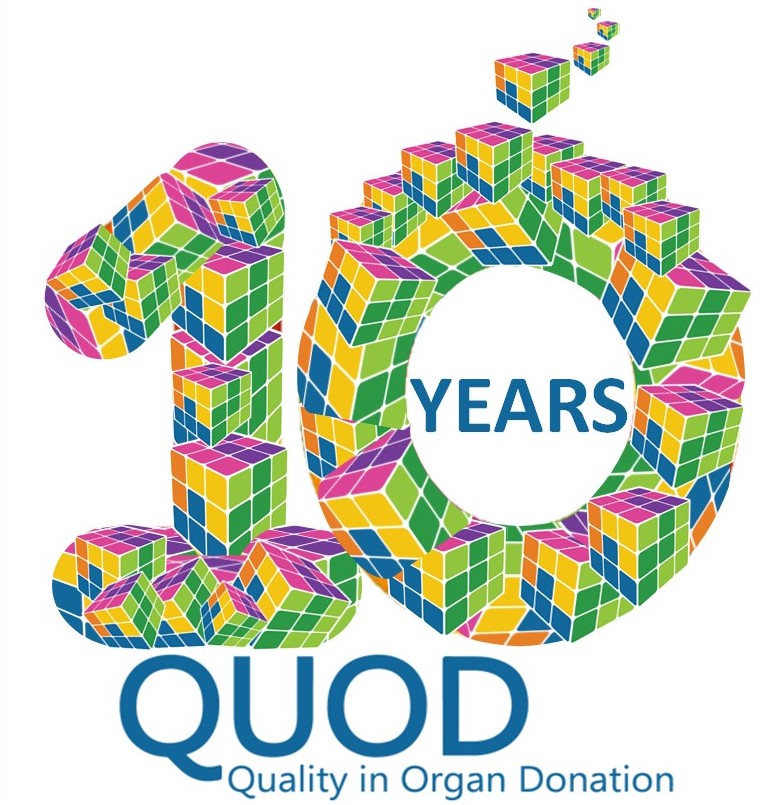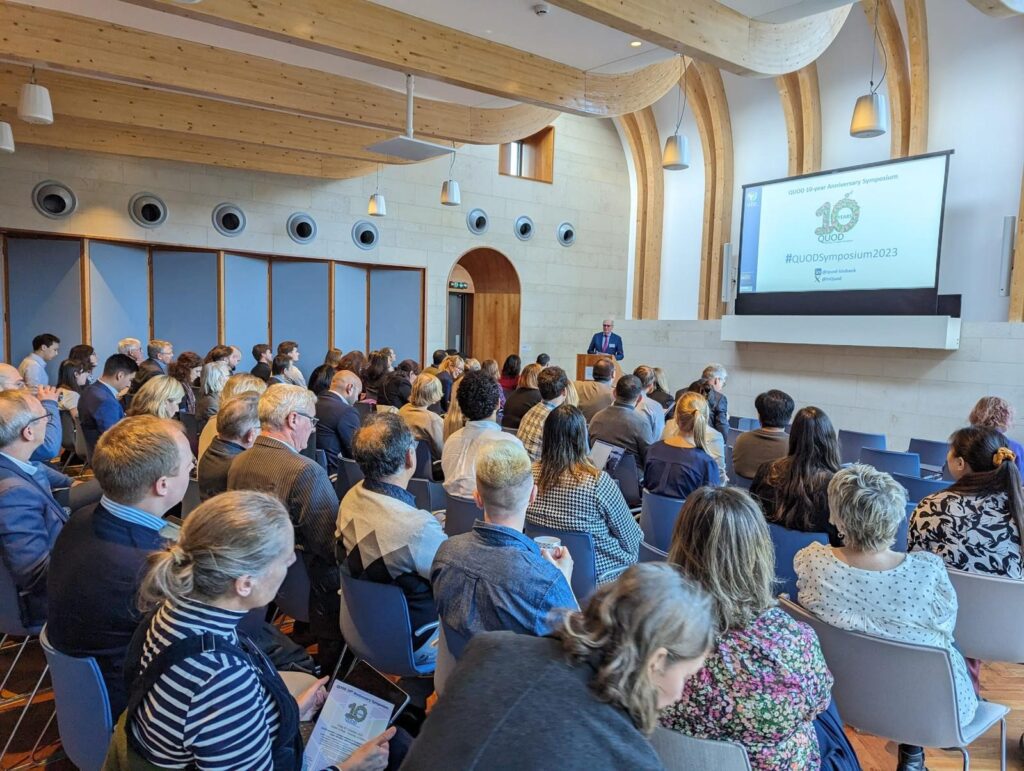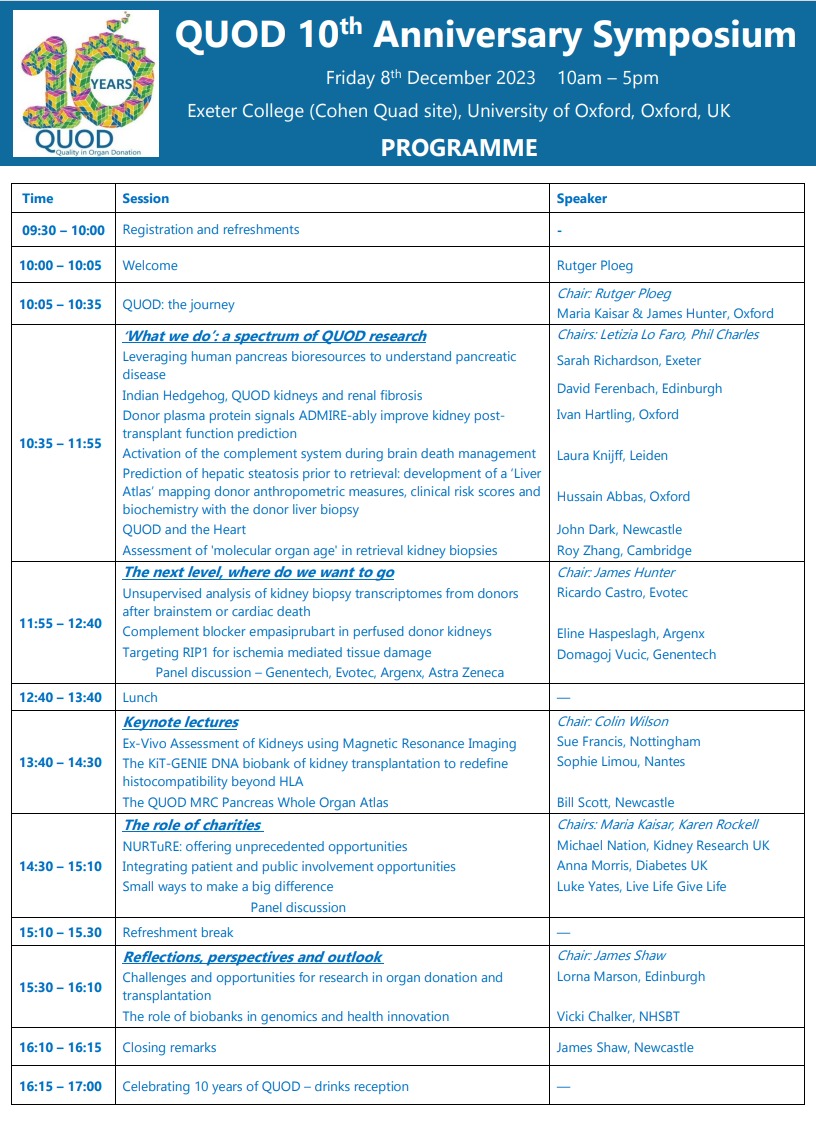
Welcome!
On Friday December 8th the QUOD team had the pleasure of welcoming delegates from across the country and beyond to Exeter College, University of Oxford. QUOD Principal Investigator, Professor Rutger Ploeg, kicked off proceedings with a welcome address to mark the tenth anniversary of the national biobank in donation and transplantation. He highlighted the enthusiasm, trust and commitment, with a lot of camaraderie and collaborative efforts of the wider consortium that has made QUOD so successful. He also acknowledged the sponsorship and vision from NHSBT, and the specialist expertise of the SNODs and the NORS teams as well as the technical support in laboratories nationwide.
The opening presentation started with a review by the QUOD Scientific and Clinical Coordinators, Dr Maria Kaisar and Professor James Hunter, who took the audience on a journey back in time acknowledging the QUOD founders and early supporters who contributed to the success of QUOD. They thanked and acknowledged the role of NHSBT colleagues, previous QUOD members and the key role of our industry partners, researchers and charities for their continuous commitment. Finally, we all recognised the selfless gift of donor and donor families consenting for research and helping to establish and strengthen the QUOD biobank.
An International Conglomeration
One of the highlights of the day was to hear the many multidisciplinary research projects that QUOD has enabled by providing samples to researchers. The scientific breadth of research was notable. We heard from Professor Sarah Richardson, how the whole pancreas atlas from donors with type I diabetes provides a platform to study pancreatic disease. Professor David Ferenbach talked about utilising QUOD samples to study the impact of aging in kidney fibrosis and Dr Ivan Hartling gave an insight on how we can use “Big Data” analysis using QUOD samples to find new markers to better assess donor organs and improve transplant outcomes for patients who are waiting for a kidney. QUOD has facilitated many research projects undertaken by PhD students for their academic research. Laura Knijff from Leiden described her project on the role of complement activation in kidney donation and Hussain Abbas described his project on developing a liver atlas to diagnose liver disease in the donor. Professor John Dark highlighted that the QUOD biobank collection of heart tissue provides a unique opportunity in heart related research and how the infrastructure of QUOD supports a national clinical trial he is leading. The scientific session closed with an exciting talk from Dr Roy Zhang on studying molecular aging in donor kidneys.
The symposium not only gave us the opportunity to hear about the ongoing research, but also showed the geographical reach of the biobank; spanning the UK, from Exeter in the south to Edinburgh in the north, Europe and the USA. We are grateful to delegates for travelling so far to present their research and celebrate the impact of QUOD in enabling research in organ donation and transplantation with us.
The industry panel, which included collaborators from Evotec, Argenx, Genentech/Roche and Astra Zeneca, presented a unique opportunity to see where industry, academia and clinical objectives align and demonstrated the mutually beneficial partnership that can be built on complementary strengths. Dr Ricardo Castro from Evotec presented results from their transcriptomics work on QUOD kidney samples including the yield of RNA, tissue composition and organ injury as sources of variance in different donor and biopsy types. Dr Eline Haspeslagh from Argenx discussed the importance of connecting clinical development with access to donor samples in the development and testing of new therapies. Dr Domagoj Vucic from Genentech/Roche travelled from San Francisco to give an overview of the involvement of RIPK1 and inhibitor therapy in ischaemia and reperfusion injury.
The panel praised the robust and sustainable infrastructure of QUOD, which has proceeded to help set-up other bio-resources such as the NHSBT Oxford COVID BioArchive (COBA) and the Oxford Transplant Biobank, as well as support the development of other initiatives such as the Organ Quality Assessment project (OrQA). An interest in a repository for samples retrieved from diseased organs or organs not considered for transplantation was also presented with the view to further tackle the disparity between the number of those that require a transplant and the number of transplantable organs available for donation.
Professor Colin Wilson chaired the keynote lectures, in which Professor Sue Francis described how we can use whole organ MRI imaging and QUOD samples to gain in-depth understanding of what drives kidney fibrosis. We were delighted to have also Professor Sophie Limou from Nantes to give one of the keynote lectures, describing the French KIT-Genie biobank. The final keynote, delivered by Dr Bill Scott, outlined the potential research directions of pancreas atlases.
In addition to talks from industry and academia, it was a treat to hear from Kidney Research UK, Diabetes UK and Live Life Give Life; charities who collectively emphasised the importance of integrating the patient voice, ensuring that there is a direct connection between research and the people that the work will benefit. Live Life Give Life is also offering funds for proof of concept for a project that would utilise QUOD samples. The importance of creating a robust and sustainable business model that would help biobanking to survive, flourish, demonstrate impact beyond peer-review publications and continue to facilitate research that would ultimately help patients was also discussed.

The Road Ahead
A great day concluded with two talks under the theme ‘Reflections, perspectives and outlook’. This final session was chaired by Professor James Shaw, chair of the QUOD Steering Committee, with talks by NHSBT Associate Medical Director for Research and Development Professor Lorna Marson and Deputy Chief Scientific Officer of NHS England Dr Vicki Chalker. We heard that biobanking has enabled the development of genomics medicine and translational research that benefits patients daily. It was clear that both industry and the charity sector would be interested in a recipient biobank and being involved in the developmental stages, such as helping to design a project and the type of data that would be collected. A strong argument was made for future collaborations that would embrace different cohorts and utilise multiple biobanks and charities to tackle multiple medical conditions. The importance of education and health literacy across all ages was also discussed, emphasising the future role of QUOD in sharing research and engaging with the public to demystify transplantation and donation and talk with patients who are directly affected.
The symposium was also a chance to reflect on the successes and future of the biobank and its scientific platform, which foresees integrating patients further into the research pillars and objectives of QUOD, the Blood and Transplant Research Unit (BTRU), NHSBT R&D and UKODTRN, a ‘research-ready’ community braced to participate in research development including grant applications.
A key message to emerge from the symposium is the desire for increased collaboration between the different sectors, to continue to expand our transplant community and to involve patients in biobanking, as we all have a shared objective to advance transplantation research. The QUOD programme aims to align issues in clinical practice and translational research where using samples with integrated clinical data is key; it also reflects a forward-thinking strategy as expressed by NHSBT and its Academic Partners.
To close, once again we would like to thank all who attended the symposium and all those across the wider QUOD community, and in particular, our heartfelt thanks go to the donors and their families, without whom none of this would be possible. Here’s to another ten years!

